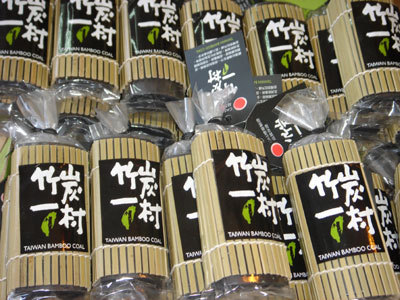Bamboo Charcoal
Taiwan has lots of bamboos resources and a good basis for development of the bamboo industry. During Taiwan's earlier economic development, bamboo was one of its important export earners. Because bamboo is a strong, fast-growing plant that has a high reproductive capacity and a short production cycle, it is one of the best renewable resources. 
In recent years, bamboo charcoal products have become increasingly popular on the market because of their various value-added properties. Both producers and consumers obtain benefits from bamboo charcoal products. The government and academics have great expectations for this industry, which is known as a happy industry. The major production areas of bamboo charcoal in Taiwan are in Nantou County, with Taiwan Bamboo Coal and Wvsiv Bamboo Charcoal being two of the major manufacturers there. The bamboo used for charcoal is usually taken from plants four years or older, and burned in several stages in an oven at temperatures ranging from 450 to 750°C. Bamboo charcoal contains calcium, magnesium, iron, potassium and magnesium, and is known to be highly porous and absorbent. It can absorb moisture and odor and act as a shield against electromagnetic waves. In addition, bamboo charcoal fabric emits far infrared rays, which are said to improve blood circulation. Bamboo vinegar, a by-product of bamboo carbonization, has disinfectant properties and can also be used as a natural preservative.
Bamboo charcoal is used in many everyday products. It is a kind of natural edible pigment and can be used as a filter to purify water. In addition, recycled charcoal can be used as a soil additive and is eco friendly. Apart from the cleaning applications of bamboo charcoal, it has other uses in the textile industry, with clothes and household items made from bamboo charcoal fiber being very popular. These products include shirts, pants, socks, bedding sets, shoe-pads, sheets, mugs, and deodorizers.
In agriculture, bamboo charcoal and vinegar are used for soil improvement, pest control and increasing crop yield. In addition, it helps to aerate soil and to control humidity. It also neutralizes oxidized soil, helps plants to grow and extends the life of flowers. On aquaculture farms, bamboo charcoal powder can be used as one of the components of water filters. Its application in animal husbandry has also produced impressive results. According to some bamboo studies, adding ground bamboo charcoal to animal feed can boost growth and greatly enhance production.
In industrial applications, high-temperature carbonized charcoal can be used in rechargeable batteries because of its electrical conductivity.According to the Council of Agriculture (COA) , there are unlimited possibilities for bamboo charcoal applications in the medical industry.
Tips on how to select bamboo charcoal products :
Choose charcoal that has no surface deformity or damage. The charcoal should have a dense structure and high gloss. Good bamboo charcoal produces a crisp, metal-like sound when tapped. Consumers are advised to buy bamboo charcoal products that carry the COA's "Certified Agricultural Standards (CAS)" label to guarantee the product quality.
